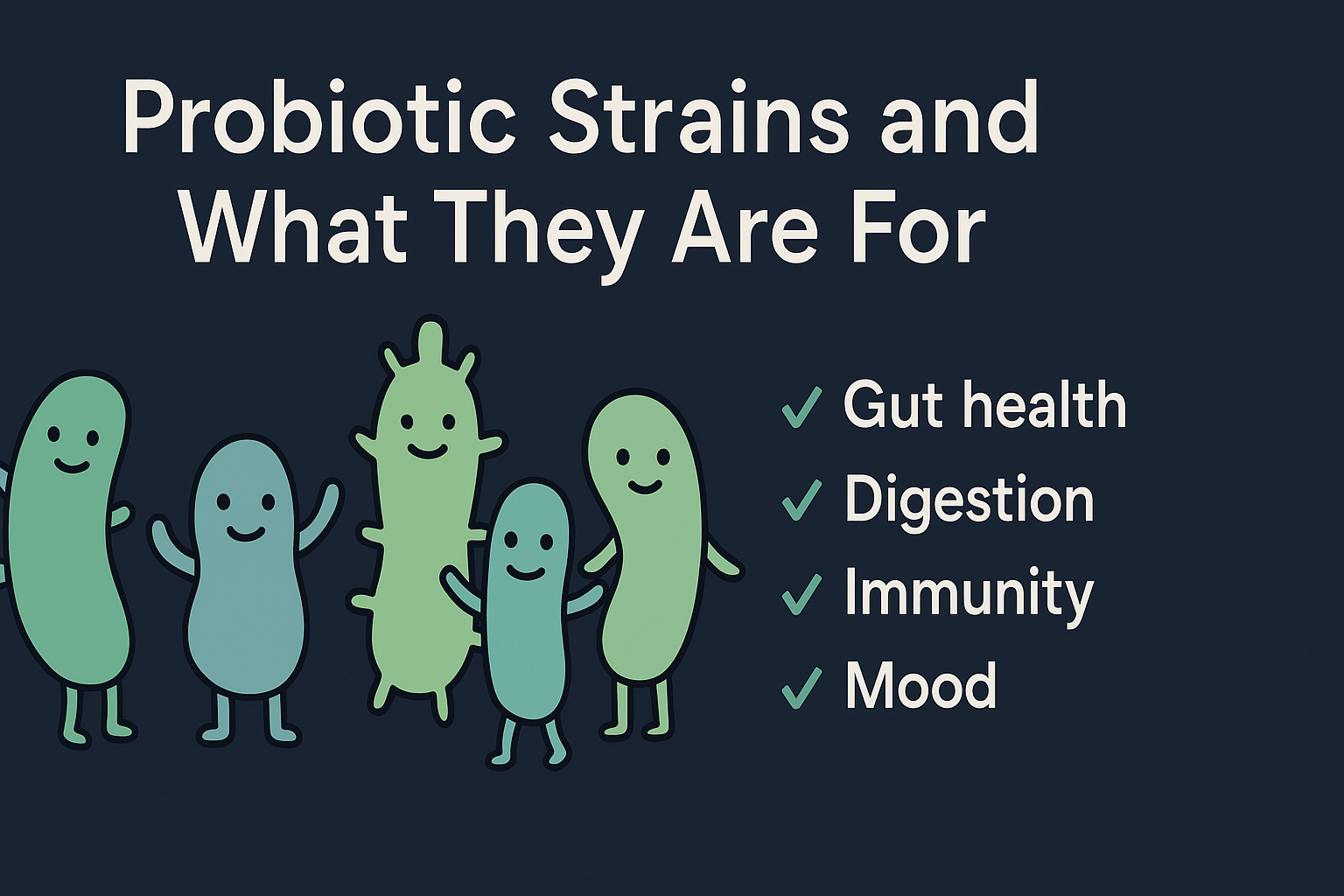Probiotic strains and what they are for
Probiotics have exploded in popularity — from yogurt drinks and kombucha to multi-strain capsules lining supplement aisles. But with all the buzz, one big question remains: Do you know which probiotic strains actually work for your body?
If you’re over 60, struggling with gut issues, or simply trying to boost your immunity and mood, understanding probiotic strains matters more than you think. Not all bacteria are created equal — and not all probiotic products are worth your money.
In this guide, we’ll break down:
- The top probiotic strains and what they help with
- Whether you need drinks and capsules, or just one
- The best strains for older adults
- What to look for in a quality supplement
🧬 What Are Probiotic Strains?
Think of probiotic strains like breeds of dogs. All dogs are canines, but a Chihuahua and a Great Dane behave very differently.
Same with probiotics:
- Genus (e.g. Lactobacillus)
- Species (e.g. Lactobacillus rhamnosus)
- Strain (e.g. Lactobacillus rhamnosus GG)
That third part — the strain — is where the magic happens. It’s what determines how a probiotic interacts with your body, what symptoms it helps, and how well it survives in your gut.
🧾 Common Probiotic Strains and What They’re For
Here are some of the most well-studied and effective probiotic strains, backed by clinical research:
| Strain | What It’s For |
|---|---|
| Lactobacillus rhamnosus GG | General gut health, traveller’s diarrhoea, immune boost |
| Bifidobacterium longum | Constipation, IBS, mental wellbeing (gut-brain axis) |
| Lactobacillus acidophilus | Digestion, lactose intolerance, vaginal health |
| Bifidobacterium infantis 35624 | IBS symptoms, bloating, abdominal pain |
| Saccharomyces boulardii | Antibiotic-related diarrhoea, gut recovery |
| Lactobacillus casei Shirota | Found in Yakult; supports digestion and immunity |
| Bacillus coagulans | Highly survivable strain, supports inflammation and immune function |
| Lactobacillus plantarum 299v | Flatulence, cramps, IBD, nutrient absorption |
| Bifidobacterium breve | Skin health, allergies, gut diversity support |
| Streptococcus thermophilus | Digestive comfort, supports lactose digestion |
💡 Tip: Look for products that list the exact strain ID (e.g. 35624), not just the species.
🥤 Probiotic Drinks vs. Capsules: Do You Need Both?
Probiotic Drinks (like Yakult or Actimel)
✅ Convenient
✅ Contain Lactobacillus casei Shirota or similar
❌ Often high in sugar
❌ Only 1–2 strains
❌ Small CFU (colony forming unit) counts
Probiotic Capsules
✅ Multi-strain (often 5–20+ strains)
✅ Higher CFU counts
✅ Targeted support (IBS, immunity, anxiety, etc.)
✅ Often combined with prebiotics (Synbiotics)
❌ May cost more per dose
Do you need both?
Not usually. If you’re taking a high-quality, multi-strain probiotic, adding a drink on top won’t add much value — unless you enjoy the taste or use it as a food vehicle.
👵 Best Probiotic Strains for Over-60s
As we age, our gut microbiome diversity decreases — which can affect digestion, immunity, mood, and nutrient absorption.
Here are the top strains for older adults:
- Bifidobacterium longum – Helps reduce inflammation and supports immune function
- Lactobacillus plantarum – Supports gut lining integrity and nutrient absorption
- Lactobacillus rhamnosus GG – Strengthens immunity, useful for fighting infections
- Bifidobacterium lactis HN019 – Shown to improve bowel regularity and digestion in elderly adults
- Saccharomyces boulardii – Excellent if taking medications or antibiotics
Also look for blends that include prebiotics like inulin or FOS to help these strains thrive.
🛒 What to Look for in a Probiotic Supplement
Here’s a quick checklist before buying:
✅ Strains are listed by full name and ID (e.g. Lactobacillus rhamnosus GG)
✅ At least 5–10 billion CFUs per serving
✅ Multi-strain blend with a mix of Lactobacillus and Bifidobacterium
✅ Prebiotics included (synbiotic formula)
✅ Refrigeration not required unless specified
✅ No added sugars or fillers
Some reputable UK brands include:
- Optibac
- Bio-Kult
- Garden of Life (raw probiotics range)
- Symprove (liquid-based, live bacteria)
🧠 Final Thoughts
If you’re serious about gut health, don’t settle for a generic “probiotic” label. Look at the strains. Understand what they’re good for. And choose one tailored to your body’s needs — especially if you’re over 60.
A probiotic drink like Yakult can be a nice daily habit, but it’s no replacement for a comprehensive, clinically-backed multi-strain supplement. Pick smart, stay consistent, and let your gut do the rest.

👉 Like this article? Share it on Facebook 💬
➡️ Join our private Facebook group here! [Join Now]

Leave a Reply